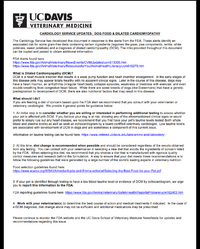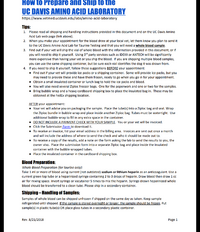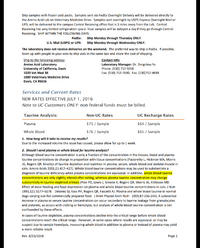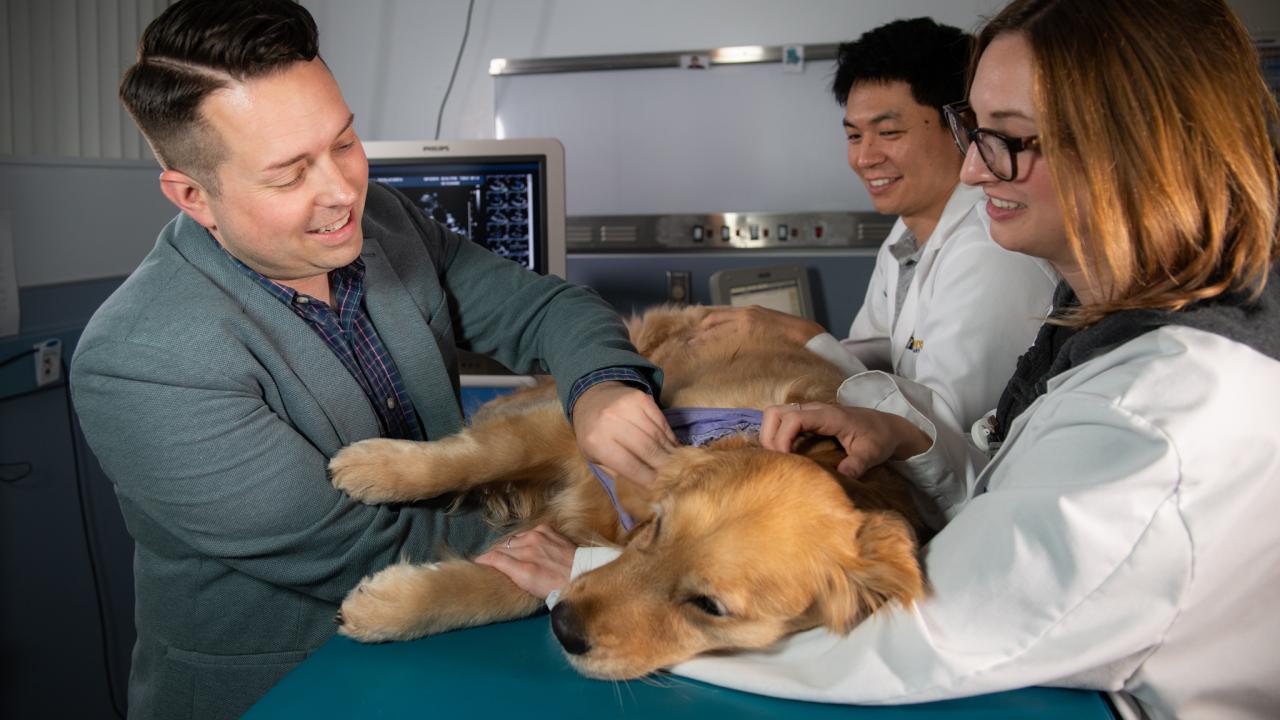Below is a good read for info. In this (highlighted her name) is our boys Cardiologist Dr. Lori Hitchcock, who has joined up with UC Davis to help collect cases and funnel them to the FDA.
I will try and get an update from her (but not until Nov.) when we go for his next appointment.
www.vetmed.ucdavis.edu/news/uc-davis-investigates-link-between-dog-diets-and-deadly-heart-disease
Dr. Josh Stern (left) examines a dog in the cardiology exam room. Hannah Webb, a cardiology technician, and Dr. Weihow Hsue, a cardiology resident, assist.
July 19, 2018
Posted by Trina Wood
The U.S. Food and Drug Administration recently issued
an alert about reports of canine dilated cardiomyopathy (DCM) in dogs eating certain pet foods containing peas, lentils, other legume seeds, or potatoes as main ingredients. DCM is a disease of the heart muscle that leads to reduced heart pumping function and increased heart size. The alterations in heart function and structure can result in severe consequences such as congestive heart failure or sudden cardiac death. While the most common cause of DCM is genetic, on rare occasions other factors can also result in the condition, particularly in breeds that are not frequently affected.
Dr. Josh Stern, a veterinary cardiologist and geneticist at UC Davis School of Veterinary Medicine, began seeing an alarming trend in cases at the veterinary hospital two years ago. Golden retrievers were being diagnosed more frequently with DCM—a disease not commonly associated with this breed. This diagnosis of DCM was coupled with another finding that many of the dogs were eating the same grain-free diet and had blood tests confirming low taurine levels. Taurine is an amino acid that dogs get naturally in their diets and manufacture from other building blocks contained in the food. Although dogs have the ability to manufacture taurine, it has been known for some time that low levels of taurine are associated with a potentially reversible form of DCM.
Since this initial observation, Stern has been recruiting and studying golden retrievers with DCM and taurine deficiency. He has observed that the vast majority of these patients respond favorably to taurine supplementation and diet change, a prognosis that is not usually noted with traditional, genetic DCM. Stern alerted the veterinary cardiology community to his finding, leading to the formation of a larger collaboration between multiple institutions and clinicians. Although golden retrievers appear more commonly affected by a taurine deficient form of this condition, the problem was noted in dogs of many breeds eating similar diets across North America.
Stern is no stranger to golden retriever research. He is the proud pet parent and veterinarian of a golden retriever enrolled in Morris Animal Foundation’s Golden Retriever Lifetime Study, as well as a researcher into genetics of cardiac disease in purebred dogs including golden retrievers. It is important to realize that in the population of golden retrievers that Stern studies with taurine-deficient DCM, the condition is not able to be explained by inheritance, as many of the dogs are completely unrelated with no familial history of prior DCM.
UC Davis is fortunate to have Drs. Andrea Fascetti and Jennifer Larsen, two of the world’s experts in veterinary nutrition and specifically taurine studies. Stern, Fascetti, Larsen, and veterinary cardiology resident Joanna Kaplan have been working together to understand the dietary link in golden retrievers with taurine deficient DCM and are in the process of submitting a manuscript documenting these findings.
Additionally, Dr. Lisa Freeman (veterinary nutritionist from Tufts University), Dr. Darcy Adin (veterinary cardiologist from North Carolina State University), Dr. John Rush (veterinary cardiologist from Tufts University),
Dr. Lori Hitchcock (veterinary cardiologist from private practice in Ohio) and Dr. Ryan Fries (veterinary cardiologist from the University of Illinois) have joined forces with UC Davis to collect cases of diet-related DCM (many of which involve other breeds and do not appear to be caused by taurine deficiency), funnel case data to the FDA, and develop protocols to provide up-to-date information to the public, veterinary community and veterinary cardiology group.
Upon investigation of all of the diets associated with both the taurine deficient and non-taurine deficient forms of DCM, a few key associations were apparent. Many dogs were being fed some variety of boutique (small manufacturer), exotic ingredient (non-traditional protein sources), or grain-free diets. These findings make up the basis of recommendations that have come from each study group and now the FDA.
The veterinary cardiologist and nutrition group has pieced together a few brief guidelines to help pet-owners navigate this complex issue:
- Evaluate the diet that you are feeding your pet. If the diet is boutique, contains exotic ingredients, or is grain free, you may consider a diet change to one without these properties. Talk to your veterinarian about the FDA announcement and what diet may be best for your dog.
- If you are concerned about your dog based on what you are feeding, watch closely for signs of heart disease such as weakness, slowing down on walks, coughing, fainting or trouble breathing. Your veterinarian may also recognize early heart disease by hearing a heart murmur or abnormal heart rhythms. If you observe these things or your veterinarian is concerned, additional testing may be indicated such as x-rays, blood tests, EKG, or heart ultrasound (echocardiogram).
- If your dog is diagnosed with DCM, particularly if eating a diet that meets the criteria listed above:
- Ask your veterinarian to test blood taurine levels.
- Report the findings to the FDA.
- Change your dog’s diet as directed by your veterinarian’s recommendations.
- Ask your veterinarian to help you identify a dose for taurine supplementation.
- Seek guidance from a veterinary cardiologist.
- Follow the instructions from your veterinarian or veterinary cardiologist as repeat evaluations and other medications may be needed. It can take multiple months to see improvement in many cases of diet-related DCM.
More info and a
statement from Nutrition Support Services at UC Davis Veterinary Hospital here.











